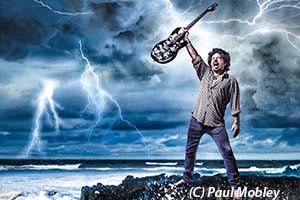Sometimes the music world can become as factionalized as the sports world. Indeed, it’s easy to forget that whether the end results are smooth pop, way-out jazz or bone-crunching rock, the sounds all flow from the same creative impulse. In late September, the Los Angeles chapter of the Recording Academy, the Guitar Center and the Musicians Institute organized Guitars in the round, a meeting of the minds that united six panelists from a widely divergent spectrum of music and life experience.
The participants were seven-string pioneer Steve Vai (a solo artist who has also worked with Frank Zappa, Whitesnake, David Lee Roth and John Lydon); virtuoso Joe Satriani (Vai’s former teacher and mentor to countless aspiring guitarists); Rage Against the Machine’s Tom Morello (on a brief break from working on the group’s upcoming concert DVD The battle of Mexico City); super session player and Toto guitarist Steve Lukather (who has collaborated with Miles Davis, Herbie Hancock, Eric Clapton and Jeff Beck, among others); former Yes guitarist and studio/soundtrack mogul Trevor Rabin; and jazz innovator and music educator Stanley Jordan.
(Because the answers are pretty autonomous, we filtered the Lukather parts for Stevelukather.com. Note Arend Slagman.)
It seems like guitar driven music -- and instrumental music -- is really getting squeezed out of radio. Does that bother you?
Lukather: "I’ve been on both sides of this one. I’ve played on a thousand albums in my career. I’ve seen a lot of people come and go but what is hip today will not be hip two years from now. If you believe in it and, like Tom says, it’s your roots and your heart and your soul and you’d do it whether you’re making money or not -- that’s the true artist. But sometimes, unfortunately, people make decisions for you that you have nothing to do with after you’ve made your art. They’re selling you and they’re selling your face, your image, whatever it is they think you believe in. People that don’t even know you are making career decisions and it’s really hard to stay [on top of it all] every step of the way. I think you have to start out by being true to yourself, and if you make conscious decisions to compromise then you’re gonna have to live with that."
Jimi Hendrix has customarily been called the best rock guitarist who ever lived. What kind of impact did his playing have on each of you?
Lukather: "I was 10 years old when the first Hendrix album, Are You Experienced?, came out in ’67. Some older kid down the street was giving me guitar lessons and said you’ve got to listen to this record. I took it home, and from note one I was completely blown away. It was like alien music. That was my first rebellion-against-your-parents music. I thought, “I’ve offended my parents,” and that was the whole point of it. Then I got into the real nuts-and-bolts genius of the man, and how deep he was, and what a short life he lived, and how he gave us so much and grew so much and changed the whole face of the time. It was all kinds of music put into one. It was R&B, it was flipped-out new sounds, new recording techniques, everything."
Was there ever a point where you had to think about your bad habits and the effects they were having on you, your playing ability and your music?
Lukather: "Ummm, you guys remember the ’80s? I don’t! [Laughs.] Actually, it really wasn’t that bad, but I did dabble a bit. I don’t recommend that, and I certainly don’t go there anymore. It was a lot worse than what people said. When I first started doing sessions in the late ’70s, I was just a kid. I was 18, 19 years old, and I’d walk into a room and there’d be piles of blow out in the open. Everybody was doing it and it was so chic at the time, and I didn’t even know what the big deal was. Then somebody goes, “Man just do some of this shit. It’ll give you a little more energy.” And I bought into that for a second, and then, ten years later, I came to. That was a weird experience. It’s a lie -- drugs and music. It seems like a good idea. Seems like you read about how all your favorite musicians get high, and heroin was the drug of choice in the ’90s, and you know where that leads. But music is really a drug in itself. I mean, when you let yourself go playing live on stage it’s almost like meditation. The energy needs to go there instead of $2000 up your nose every week."
Musicplayer.com, September 2001




